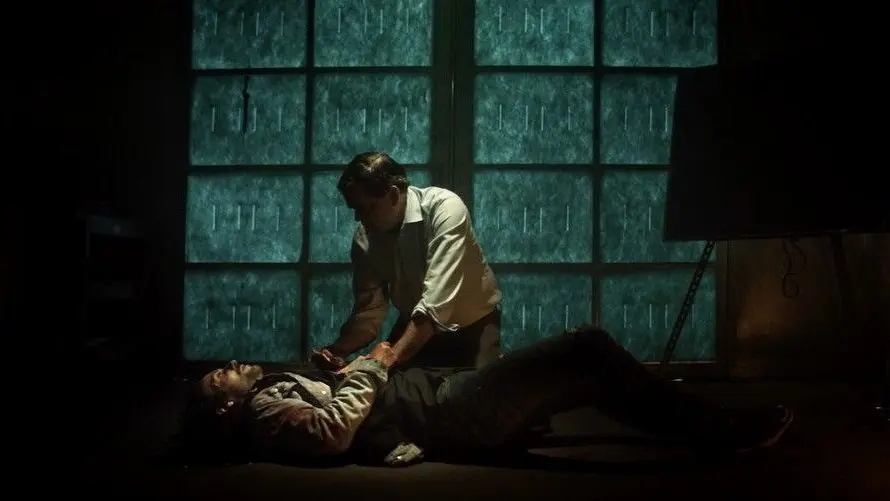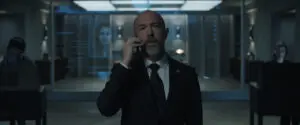Summary
A sci-fi film noir about the implications of knowing the future, and the motivation to change it. Tense, sharply written, and a very satisfying watch.
When James (Adrian Glynn McMorran) was small, he foresaw the death of his mother and was unable to prevent it. As a result, he grew up believing that it makes no difference what he does, so he uses his occasional clairvoyant visions for petty crime instead of changing the world. Two things change for James in Volition which put his belief in predestination to the test: he makes a new friend, Angela (Magda Apanowicz); and he also sees his own death. Does James have the capacity to change what he foresees, and if not, is it worth trying?
Yes, I’ve seen Predestination, but the film which used that concept explicitly was Terminator 2: Judgement Day. Excuse me if I seem to be going unusually Hollywood right now, but the famous line, “There’s no fate but what we make for ourselves,” has been kind of a motto for me in the last year or so, while I’ve been going through some personal changes: I like to think I can decide life for myself at this point. Consequently, I was wary of Volition from a very early scene when I saw how the lead character so firmly felt the opposite: how can James be the hero of the story if he doesn’t believe his actions matter? But although my description above may suggest a Philip K Dick style story, this one is indeed bleaker than a typical Dick adaptation: James pushes against fate, against his better judgment, and… well, I’m not going to tell you whether things are all mapped out for him or not.
Volition is one of those films, like Memento or Timecrimes, in which the viewer and lead character alike only have enough pieces to put the picture together as the film nears its end. And like those other films, you can put the picture together more effectively if you catch all the pieces that are thrown casually at you. The script is beautifully assembled, so that although the viewer never sees any more than James does (we get to see his visions too), it is not confusing, but rather flows well and draws the viewer into seeing life as James does.
Actually (if you’ll excuse a little tangent), the similarity to Memento was brought to my attention early on when I saw James taking notes; and I was mildly dismayed about what looked like the reuse of tropes. Shortly after, I was led to expect (or thought I was) a retelling of what I consider to be the Kung Fu Panda theme (“One often meets his destiny on the road he takes to avoid it.” Master Oogway)… But Volition was frankly so well written and directed that I think this has become – finally – the film that demonstrates to me that it doesn’t always matter if familiar components are reused if they are put to good use and if they work smoothly with other components or the film as a whole. I’ve put too much weight on originality to date, I think: you may think as you watch Volition that you’ve seen this, that or the other before, but trust me; it’s unlikely you’ve seen these cards played so well. OK, tangent over.

Where was I? Yes: the story, complex though it is, flows exceptionally well. Directed by Tony Dean Smith, and written by him in partnership with his brother Ryan W Smith; this partnership is a success. The two must have thrashed out the story until no holes could be found; produced it together, making it look and feel solid; and Tony led the crew as director. Along with cinematographer Byron Kopman and composer Matthew Rogers I’ve found some talent worth following here.
I know I may seem kind of smitten here, but I’ve just watched Volition a second time, and I still have seen no plot holes. There are a couple of flaws, naturally, but they really don’t make much difference to the enjoyment of the film, or its thought-provoking nature. The one flaw I noticed during the film was the way the science part of the sci-fi was simply accepted, with little discussion. But to do so would have been to slow down the pace, and there was just about enough (well managed) exposition, so I didn’t mind them doing without that bit. When it comes to science fiction, Volition is the philosophical kind, though, rather than the “hard sci-fi”; so you know, oh well, never mind the details. (But it is “true sci-fi”, in that the story would not have worked without those elements.)
The other flaw was in Angela’s character, in that we didn’t get to know very much about her. Granted, we got to know about as much as James did, and it’s his story; but she felt more like a walking, talking plot device in retrospect. Magda Apanowicz played her well though (with more nuance than her role in The Green Inferno demanded!), and she gave the friendship between Angela and James real warmth.
The secondary characters were written with a range of depth: the crooks were fairly clichéd while the most interesting was Eliot (Bill Marchant), James’ foster father, who we see at several different ages. Their relationship was fascinating, as Eliot must have required both affection and intellect to support James growing up with his tragic Cassandra complex.
Volition is promoted as a “time-bending sci-fi thriller”, but to me, it’s just as much a noir thriller as a sci-fi one. We have gangsters and low-lives, a damsel in distress, stolen diamonds and shoot-outs, hope, and despair. Ultimately, it’s a story about a man discovering the motivation to take control of his actions, and it’s a very satisfying 90 minutes indeed.




